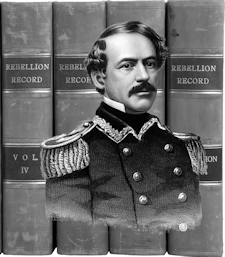Jan. 30. Our canteens are again filled with the contraband water, so we shall be all right today as far as that is concerned. Some of the boys made a raid last night on the sutler’s stuff and appropriated to themselves pretty much what he had. I cannot approve of that, as the sutler is at a good deal of trouble and expense to get a few notions for us and probably sells them as cheap as he can afford. The boys ought not to steal from him, at this time especially, as there are those who would be glad to buy. A schooner came down today to take a look at us, one of our boats gave chase, but a good breeze blowing, the schooner had the advantage and got away. This afternoon a small boat was seen coming down flying a white flag. The boat contained one darkey who had risked the perils of the sound to escape from the land of Jeff, the house of bondage.
A Discovery.
A great discovery has just been made and isn’t there larks now, though. The skipper is foaming with rage. An account of stock has been taken, and a cask or two of water is missing. On inspection it was found tapped at the wrong end. A very mysterious circumstance, but such things are liable to happen. A strong guard has been placed over the other casks.









